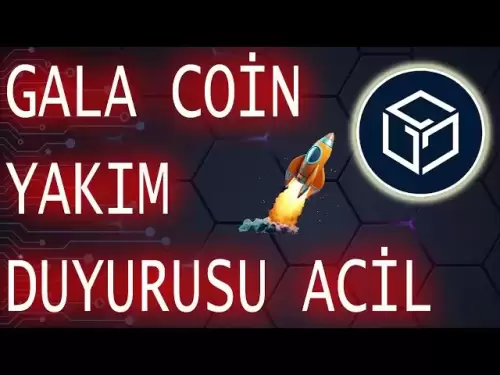-
 Bitcoin
Bitcoin $106,731.2224
-1.05% -
 Ethereum
Ethereum $2,444.9804
-1.20% -
 Tether USDt
Tether USDt $1.0003
0.01% -
 XRP
XRP $2.1882
0.09% -
 BNB
BNB $651.1435
-0.61% -
 Solana
Solana $148.3252
-2.09% -
 USDC
USDC $1.0000
0.01% -
 TRON
TRON $0.2787
0.55% -
 Dogecoin
Dogecoin $0.1598
-3.16% -
 Cardano
Cardano $0.5520
-2.43% -
 Hyperliquid
Hyperliquid $39.0960
-2.64% -
 Bitcoin Cash
Bitcoin Cash $516.9519
2.98% -
 Sui
Sui $2.7011
-2.95% -
 Chainlink
Chainlink $13.0582
-1.71% -
 UNUS SED LEO
UNUS SED LEO $8.9250
-2.53% -
 Stellar
Stellar $0.2359
-0.18% -
 Avalanche
Avalanche $17.3856
-3.73% -
 Toncoin
Toncoin $2.8095
-3.56% -
 Shiba Inu
Shiba Inu $0.0...01121
-1.95% -
 Litecoin
Litecoin $85.2795
-0.85% -
 Hedera
Hedera $0.1471
-2.15% -
 Monero
Monero $319.8004
1.12% -
 Dai
Dai $1.0001
0.01% -
 Ethena USDe
Ethena USDe $1.0001
0.02% -
 Bitget Token
Bitget Token $4.5344
-1.07% -
 Polkadot
Polkadot $3.3224
-2.96% -
 Uniswap
Uniswap $6.9697
-2.75% -
 Aave
Aave $266.1658
-2.25% -
 Pepe
Pepe $0.0...09414
-3.41% -
 Pi
Pi $0.4913
-3.29%
What is the difference between an ETH wallet address and a smart contract address?
Ethereum wallets, user-controlled and holding ETH/ERC-20 tokens, differ from programmatically-controlled smart contracts. Wallets receive/send funds directly; smart contracts interact via transactions triggering functions within their code. Understanding this distinction is crucial for secure Ethereum use.
Mar 15, 2025 at 02:10 am
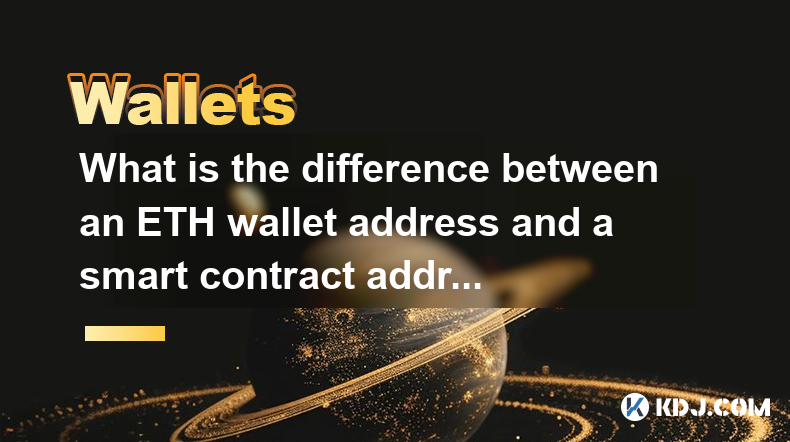
Key Points:
- Ethereum wallets hold ETH and ERC-20 tokens; smart contract addresses execute code.
- Wallet addresses are user-controlled; smart contract addresses are programmatically controlled.
- Wallet addresses receive and send funds; smart contract addresses interact with the blockchain based on predefined rules.
- You interact with wallets directly; you interact with smart contracts through transactions triggering specific functions.
- Understanding the difference is crucial for secure and effective Ethereum usage.
What is the difference between an ETH wallet address and a smart contract address?
The Ethereum blockchain hosts two fundamental entities with distinct functionalities: Ethereum wallets and smart contracts. While both utilize addresses on the blockchain, their purposes and operational mechanisms differ significantly. Understanding this difference is critical for navigating the Ethereum ecosystem safely and effectively.
An ETH wallet address is essentially a unique identifier linked to a private key. This private key allows the owner to control the cryptocurrency (ETH and ERC-20 tokens) associated with that address. Think of it like a bank account number – it identifies where your funds are held. You can receive and send cryptocurrency to and from this address. Security relies heavily on keeping your private key confidential.
Conversely, a smart contract address represents a deployed program on the Ethereum blockchain. It's not a container for funds in the same way a wallet is. Instead, it's a self-executing contract with predefined rules and conditions. These rules dictate how the contract responds to specific transactions. The address identifies this program, enabling interaction with its functionality. You don't "own" a smart contract address in the same way you own a wallet; you interact with it.
The key distinction lies in control and function. You, the user, directly control your wallet address and the funds it holds. You initiate transactions to send or receive cryptocurrency. Smart contract addresses, however, operate autonomously based on their programmed logic. They don't have a "owner" in the traditional sense. Their actions are triggered by transactions that interact with the functions defined within the contract’s code.
Accessing and interacting with these addresses also differs. You interact directly with your ETH wallet address through your chosen wallet software (e.g., MetaMask, Trust Wallet). Interaction with a smart contract address requires sending transactions that specify the contract address and the function you wish to execute within that contract. This usually involves interacting with a decentralized application (dApp) that handles the complexities of interacting with the smart contract.
How are ETH wallet addresses generated?
ETH wallet addresses are cryptographically generated from your private key. This process is handled automatically by your chosen wallet software. You don't typically generate them manually. The software uses cryptographic hashing algorithms to derive a unique public address from your private key. This public address is what you share with others when receiving payments.
How are smart contract addresses generated?
Smart contract addresses are generated automatically upon deployment of the contract to the Ethereum blockchain. The address is determined by the transaction deploying the contract and is unique to that specific contract's bytecode. You don't choose the address; the network assigns it.
Can a smart contract hold ETH?
Yes, smart contracts can hold ETH and other tokens. This is often a crucial aspect of their functionality. Many decentralized finance (DeFi) applications rely on smart contracts to manage and distribute funds according to predefined rules. However, accessing these funds usually requires interacting with specific functions within the contract. You cannot simply send funds to a smart contract and expect them to be immediately available to you; you must use the appropriate function calls defined in the contract's code.
What happens if I lose my private key for my ETH wallet?
Losing your private key means losing access to the ETH and tokens held in that wallet. There's no recovery mechanism. Therefore, secure key management is paramount. Use strong passwords, enable two-factor authentication, and consider using hardware wallets for added security.
What happens if a smart contract has a bug?
Bugs in smart contracts can have severe consequences, potentially leading to loss of funds or unintended actions. This highlights the importance of thorough auditing and testing before deploying smart contracts. Exploitable vulnerabilities are a significant risk in the DeFi space. Updates and fixes to smart contracts are often difficult or impossible depending on the contract's design.
Can I transfer ETH directly from a smart contract to my wallet?
You can transfer ETH from a smart contract to your wallet, but only if the smart contract has a function specifically designed for this purpose. You need to trigger this function through a transaction, providing your wallet address as a parameter. The transaction will execute the code within the smart contract, sending the ETH to your specified address.
What are the security implications of using smart contracts?
Smart contracts, while offering automation and transparency, introduce unique security risks. Bugs, vulnerabilities, and malicious code can lead to significant financial losses. Thorough audits, rigorous testing, and careful selection of reputable developers are crucial to mitigate these risks. Always thoroughly research any smart contract before interacting with it.
Common Questions and Answers:
Q: Can I send ETH to a smart contract address? A: Yes, but only if the smart contract is designed to receive ETH and has functions to handle it appropriately. Sending ETH to a smart contract that doesn't expect it may result in the loss of those funds.
Q: Is a smart contract address the same as a wallet address? A: No. A wallet address represents a user-controlled account holding funds, while a smart contract address represents a deployed program on the blockchain executing code.
Q: Can I create a smart contract address? A: No, you can't directly create a smart contract address. It's automatically generated upon the deployment of the smart contract code to the Ethereum blockchain.
Q: How do I find a smart contract address? A: You typically find smart contract addresses through the documentation or interface of the decentralized application (dApp) that utilizes the smart contract.
Q: What is the purpose of an ETH wallet address? A: An ETH wallet address is your unique identifier on the Ethereum blockchain for receiving and sending ETH and ERC-20 tokens. It's linked to your private key, which grants you control over your funds.
Disclaimer:info@kdj.com
The information provided is not trading advice. kdj.com does not assume any responsibility for any investments made based on the information provided in this article. Cryptocurrencies are highly volatile and it is highly recommended that you invest with caution after thorough research!
If you believe that the content used on this website infringes your copyright, please contact us immediately (info@kdj.com) and we will delete it promptly.
- Meme Coins Mania: Arctic Pablo Leads the New Crypto Pack
- 2025-07-02 06:30:11
- Meme Coins on the Move: Arctic Pablo, Bone ShibaSwap, and the Quest for the Next Big Thing
- 2025-07-02 06:30:11
- Crypto ETFs: Navigating the US Market Path and SEC Considerations
- 2025-07-02 06:50:12
- Pepeto: The Frog-Themed Meme Coin Set to Outperform in Q3 2025?
- 2025-07-02 05:10:12
- SYRUP Price Swings: Navigating the Opportunity
- 2025-07-02 06:35:12
- Altcoins, Collaboration, and Trump: A Wild Ride in Crypto
- 2025-07-02 05:10:12
Related knowledge
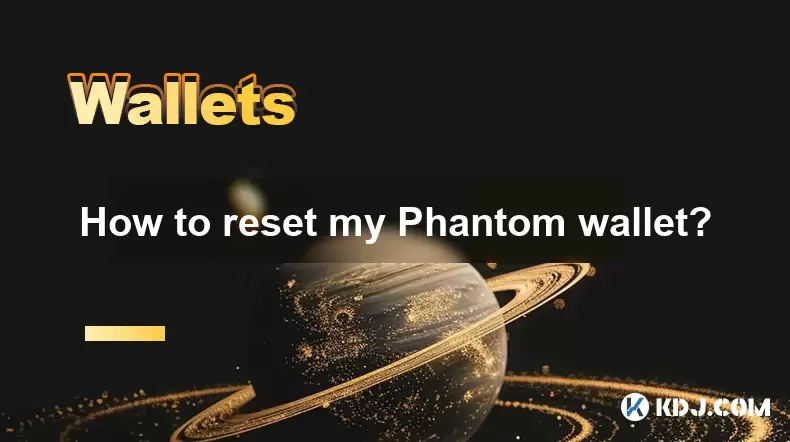
How to reset my Phantom wallet?
Jul 02,2025 at 12:36am
Understanding the Need for Resetting Your Phantom WalletIf you're using a Phantom wallet, you may encounter situations where resetting your wallet becomes necessary. This could be due to forgotten passwords, seed phrase issues, or account corruption. Phantom is a non-custodial wallet primarily used for interacting with the Solana blockchain, and it stor...
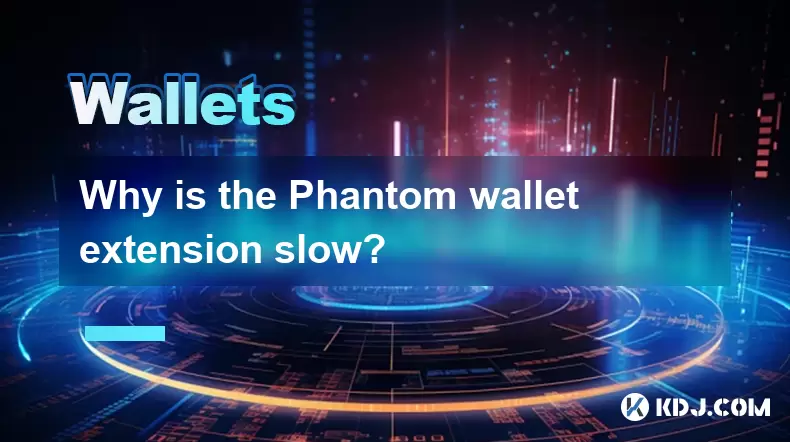
Why is the Phantom wallet extension slow?
Jul 02,2025 at 04:15am
Phantom Wallet Extension: Why Is It Slow?Phantom wallet is a widely used browser extension for interacting with decentralized applications (dApps) on the Solana blockchain. Despite its popularity, some users report that the Phantom wallet extension runs slowly at times. This article delves into potential reasons behind this performance issue and provide...
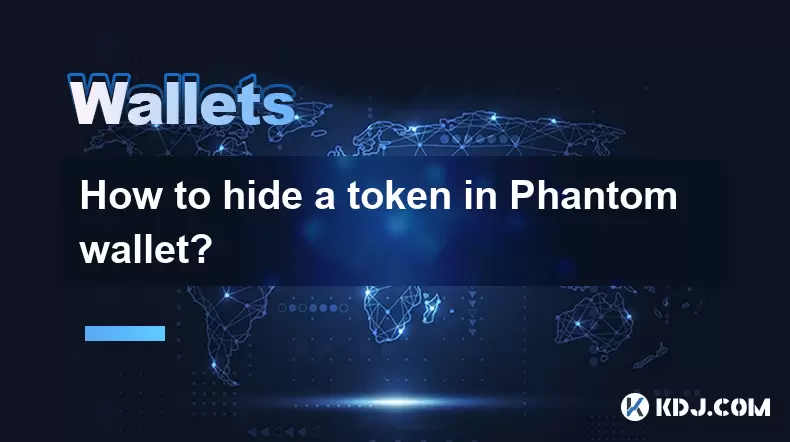
How to hide a token in Phantom wallet?
Jul 01,2025 at 05:49pm
Understanding the Phantom Wallet InterfacePhantom wallet is a popular non-custodial wallet used primarily for interacting with the Solana blockchain. It allows users to store, send, receive, and manage various tokens, including both fungible and non-fungible tokens (NFTs). Before attempting to hide a token, it's essential to understand how the wallet in...
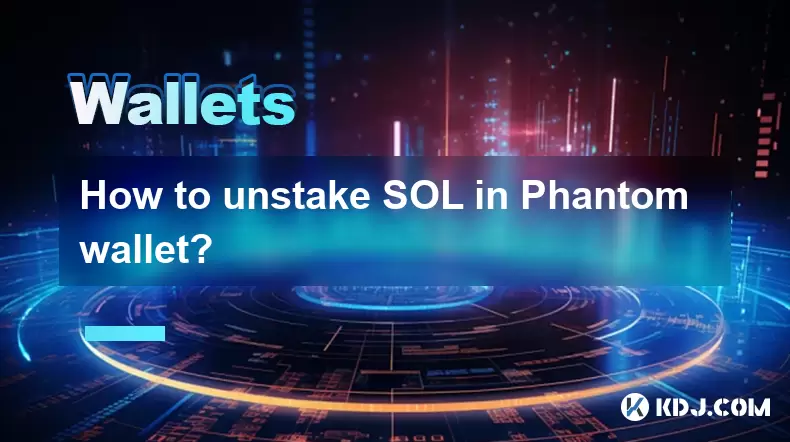
How to unstake SOL in Phantom wallet?
Jul 02,2025 at 06:49am
What Is Staking SOL in Phantom Wallet?Staking SOL involves locking up your SOL tokens to support the Solana network and earn rewards. The Phantom wallet, a popular non-custodial wallet for Solana, allows users to stake their SOL directly from the interface. When you stake SOL, it becomes temporarily unavailable as it is delegated to a validator. This pr...
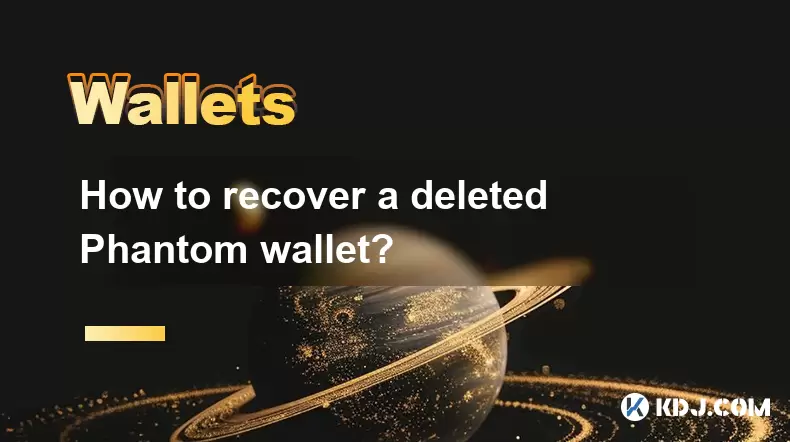
How to recover a deleted Phantom wallet?
Jul 02,2025 at 04:49am
What is a Phantom wallet?Phantom wallet is a popular non-custodial cryptocurrency wallet primarily used for interacting with the Solana blockchain. It allows users to store, send, receive, and manage digital assets like SOL tokens and NFTs. As a browser extension and mobile app, it provides a seamless interface for developers and traders alike. Since it...
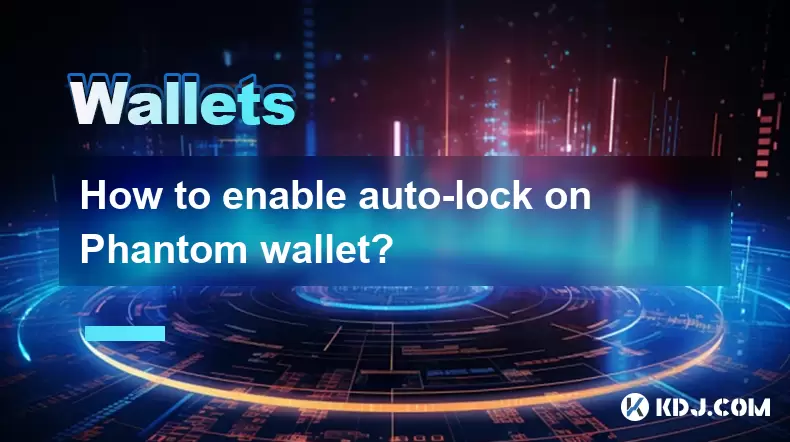
How to enable auto-lock on Phantom wallet?
Jul 01,2025 at 04:01pm
What is Auto-Lock in Phantom Wallet?Phantom wallet is a popular non-custodial cryptocurrency wallet used primarily for interacting with the Solana blockchain. One of its security features includes the ability to set an auto-lock timer, which ensures that the wallet locks itself automatically after a period of inactivity. Auto-lock enhances security by p...

How to reset my Phantom wallet?
Jul 02,2025 at 12:36am
Understanding the Need for Resetting Your Phantom WalletIf you're using a Phantom wallet, you may encounter situations where resetting your wallet becomes necessary. This could be due to forgotten passwords, seed phrase issues, or account corruption. Phantom is a non-custodial wallet primarily used for interacting with the Solana blockchain, and it stor...

Why is the Phantom wallet extension slow?
Jul 02,2025 at 04:15am
Phantom Wallet Extension: Why Is It Slow?Phantom wallet is a widely used browser extension for interacting with decentralized applications (dApps) on the Solana blockchain. Despite its popularity, some users report that the Phantom wallet extension runs slowly at times. This article delves into potential reasons behind this performance issue and provide...

How to hide a token in Phantom wallet?
Jul 01,2025 at 05:49pm
Understanding the Phantom Wallet InterfacePhantom wallet is a popular non-custodial wallet used primarily for interacting with the Solana blockchain. It allows users to store, send, receive, and manage various tokens, including both fungible and non-fungible tokens (NFTs). Before attempting to hide a token, it's essential to understand how the wallet in...

How to unstake SOL in Phantom wallet?
Jul 02,2025 at 06:49am
What Is Staking SOL in Phantom Wallet?Staking SOL involves locking up your SOL tokens to support the Solana network and earn rewards. The Phantom wallet, a popular non-custodial wallet for Solana, allows users to stake their SOL directly from the interface. When you stake SOL, it becomes temporarily unavailable as it is delegated to a validator. This pr...

How to recover a deleted Phantom wallet?
Jul 02,2025 at 04:49am
What is a Phantom wallet?Phantom wallet is a popular non-custodial cryptocurrency wallet primarily used for interacting with the Solana blockchain. It allows users to store, send, receive, and manage digital assets like SOL tokens and NFTs. As a browser extension and mobile app, it provides a seamless interface for developers and traders alike. Since it...

How to enable auto-lock on Phantom wallet?
Jul 01,2025 at 04:01pm
What is Auto-Lock in Phantom Wallet?Phantom wallet is a popular non-custodial cryptocurrency wallet used primarily for interacting with the Solana blockchain. One of its security features includes the ability to set an auto-lock timer, which ensures that the wallet locks itself automatically after a period of inactivity. Auto-lock enhances security by p...
See all articles





















